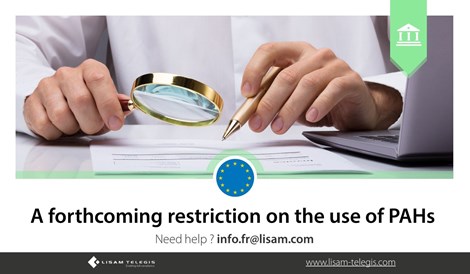A forthcoming restriction on the use of PAHs
A forthcoming restriction on the use of PAHs
mardi 22 novembre 2022
 Polycyclic aromatic hydrocarbons (PAHs) are chemical compounds containing only carbon and hydrogen and formed from several aromatic rings (from two-ring naphthalene derivatives to more complex structures containing up to 10 rings). PAHs occur naturally in the environment (volcanic eruptions, fire fumes) but can also be produced by humans. Indeed, they are generally formed during the incomplete combustion of coal, crude oil or petrol and can therefore bind to other molecules during industrial processes where these raw materials are used (vehicle emissions, metallurgy or waste incineration).
Polycyclic aromatic hydrocarbons (PAHs) are chemical compounds containing only carbon and hydrogen and formed from several aromatic rings (from two-ring naphthalene derivatives to more complex structures containing up to 10 rings). PAHs occur naturally in the environment (volcanic eruptions, fire fumes) but can also be produced by humans. Indeed, they are generally formed during the incomplete combustion of coal, crude oil or petrol and can therefore bind to other molecules during industrial processes where these raw materials are used (vehicle emissions, metallurgy or waste incineration). In recent years, PAHs have been the subject of several controversies concerning their use because of their toxicological and ecotoxicological properties. It’s in this context that ECHA's Risk Assessment Committee (RAC) decided to support the proposal submitted by ECHA to restrict the use of PAHs in clay targets for shooting. This restriction aims to limit the formation and accumulation in the environment of these toxic and very persistent substances, which can subsequently accumulate in humans and animals.
The restriction proposed by ECHA introduces a concentration limit of 0.005% by weight of polycyclic aromatic hydrocarbons that are contained in the binders used to produce the clay targets. This limit would take effect after a one-year transition to a concentration limit of 1%.
This restriction appears necessary in order to limit the accumulation of these chemical compounds in the environment. Indeed, when used, clay targets are broken up by the shot in the open environment with too little possibility to apply risk management measures. It is now estimated that the use of these targets is responsible for the release of approximately 270 tonnes of PAHs per year into the environment. Indeed, a lot of studies show that long-term irrigation with industrial effluents mixed with municipal wastewater has resulted in excessive accumulation of PAHs in agricultural soils. PAHs in these soils account for a potential risk to human health along the food chain because vegetables grown on wastewater-contaminated soils can absorb these pollutants in sufficient quantities to also contribute to human exposure to environmental carcinogens. This restriction is also justified because it would allow a significant reduction of human exposure to PAHs and the associated cancer risk for workers and the public handling and firing clay targets.
Finally, the Committee for Socio-economic Analysis (SEAC) also supports ECHA's restriction in its draft opinion. In order to cope with this future restriction, studies are underway to assess the cost of this transition on a European scale as well as the availability of bio-resins.
The 60-day consultation on the draft opinion was open until 14 November 2022 and the Committee is expected to adopt its opinion in December 2022.
